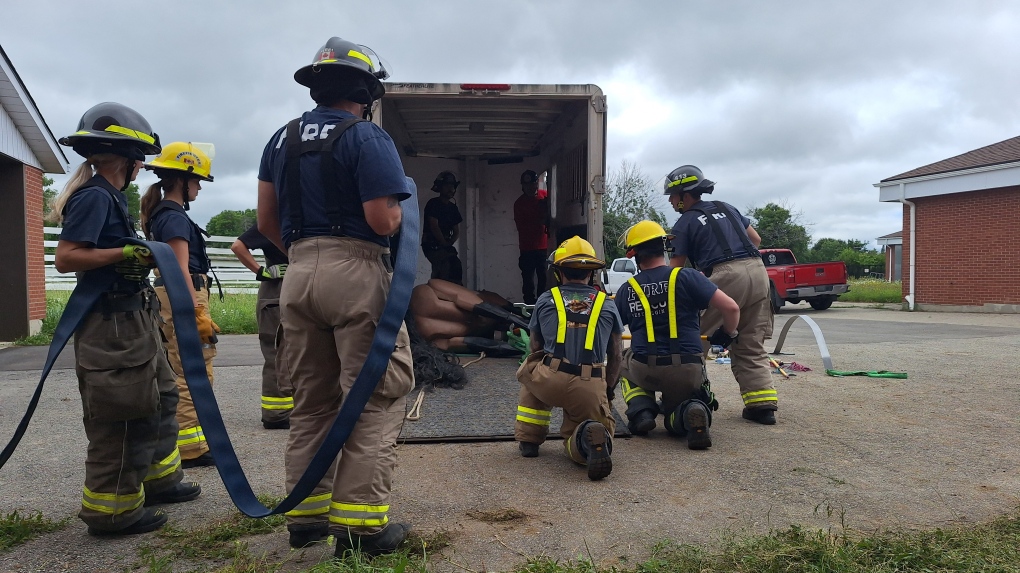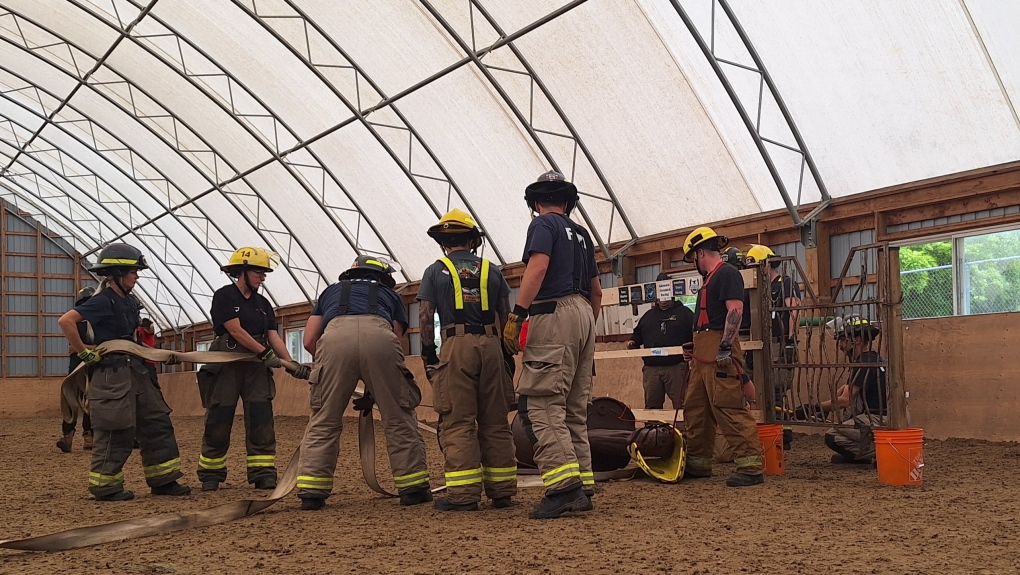Fire crews from across Ontario take part in large animal rescue training in Guelph, Ont.
Firefighters from across Ontario spent their Canada Day long weekend learning how to rescue large animals during an emergency.
Firefighters from Hamilton, Milton, Lucknow, Chatsworth, Caledon, Halton Hills, West Elgin, and Ramara attended the two-and-a-half day training program hosted by Equine Guelph at the University of Guelph.
“We focus on education programs for horse owners and those involved with the horse industry,” Communications and Program Officer for Equine Guelph Susan Raymond explained. “We have a large animal emergency rescue program and that focuses on welfare and well-being of both animals who are involved in an incident, but we also focus on the safety of those that are trying to rescue it.”
The training involved a wide variety of simulations involving real animals, smoke, and other props.
“We’re fortunate that University of Guelph has a teaching herd that we’re using for today, but we also have mannequins. If practice for an incident is not safe to use an actual animal we have mannequins,” Raymond said on Sunday afternoon.
 An instructor from Equine Guelph walks firefighters through a demonstration on how to safely remove a horse from a trailer following a crash. June 30, 2024. (Shelby Knox/CTV News)
An instructor from Equine Guelph walks firefighters through a demonstration on how to safely remove a horse from a trailer following a crash. June 30, 2024. (Shelby Knox/CTV News)
Despite coming from different stations, the firefighters struck a chord, and worked together as trainers put them through their paces. For some of the participants, working with such large animals was a new experience.
“We have a few individuals that have never, ever touched a horse before, so it’s their first time handling a horse. We have others that are quite experienced,” Raymond told CTV News. “We start at [a] baseline to give everybody an idea of what best practices are no matter what the experience level is.”
Throughout the two-and-a-half day course, participants learned how to safely move an incapacitated animal, how to handle them with care, and how to prioritize incident control management in the event of an emergency. Some of the scenarios included rescuing a horse stuck under a fence, how to assess animals and safely remove them during a barn fire, extracting a horse from a trailer following a crash, and how to respond to a mass casualty event involving several animals and humans.
“So we’re giving everybody a baseline for how to respond to an incident to keep themselves safe. So when they show up to a barn incident they’ll know who to talk to. They’ll be familiar with the equipment. They know what they have, and they’ll know who to call for further backup,” lead instructor Victor MacPherson said.
The training also showed firefighters how to use equipment normally found on their firetrucks to efficiently respond to a situation involving large animals.
“The interaction between us and the firefighters is a testament to the skill level that we’re bringing out of them. So now they’re feeling comfortable and understand the hazards and concerns of an incident on the farm,” MacPherson added.
 Firefighters take part in a mass casualty exercise as part of a large animal emergency rescue program hosted by Equine Guelph on June 30, 2024. (Shelby Knox/CTV News)
Firefighters take part in a mass casualty exercise as part of a large animal emergency rescue program hosted by Equine Guelph on June 30, 2024. (Shelby Knox/CTV News)
MacPherson encouraged first responders and other people who work with large animals to visit Farm Food Care Ontario’s website to view videos and guides that may help them navigate emergency situations. More information on training programs can also be found online.
The trailer used in the training program was provided by System Equine.
Raymond said the program is funded by Grand River Agricultural Society with the help of interested community members, sponsors and partners such as Chantal Mitchell Racing, Ellis Racing, Felix Marion Farrier Services, First Line Training Center, Flexineb, Gemrich Transport, Glenview Livestock Racing, Jonathan Drury Racing, Let it Ride Stable, Ontario Farm & Food Care Ontario, Ontario Livestock & Poultry Council, Pit Bull Stable, System Equine, Tony Beaton Racing.
CTVNews.ca Top Stories

W5 Investigates 'I never took part in beheadings': Canadian ISIS sniper has warning about future of terror group
An admitted Canadian ISIS sniper held in one of northeast Syria’s highest-security prisons has issued a stark warning about the potential resurgence of the terror group.
'Absolutely been a success': Responders looks back at 988, Canada's Suicide Crisis Helpline, one year later
In its first year, responders for Canada's Suicide Crisis Helpline, known as 988, have answered more than 300,000 calls and texts in communities nationwide.
Prime Minister Trudeau meets Donald Trump at Mar-a-Lago
Prime Minister Justin Trudeau landed in West Palm Beach, Fla., on Friday evening to meet with U.S.-president elect Donald Trump at Mar-a-Lago, sources confirm to CTV News.
Nova Scotia PC win linked to overall Liberal unpopularity: political scientist
Nova Scotia Premier Tim Houston is celebrating his second consecutive majority mandate after winning the 2024 provincial election with 43 seats, up from 34. According to political science professor Jeff MacLeod, it's not difficult to figure out what has happened to Liberals, not just in Nova Scotia but in other parts of Canada.
'Mayday! Mayday! Mayday!': Details emerge in Boeing 737 incident at Montreal airport
New details suggest that there were communication issues between the pilots of a charter flight and the control tower at Montreal's Mirabel airport when a Boeing 737 made an emergency landing on Wednesday.
Hit man offered $100,000 to kill Montreal crime reporter covering his trial
Political leaders and press freedom groups on Friday were left shell-shocked after Montreal news outlet La Presse revealed that a hit man had offered $100,000 to have one of its crime reporters assassinated.
Questrade lays off undisclosed number of employees
Questrade Financial Group Inc. says it has laid off an undisclosed number of employees to better fit its business strategy.
Cucumbers sold in Ontario, other provinces recalled over possible salmonella contamination
A U.S. company is recalling cucumbers sold in Ontario and other Canadian provinces due to possible salmonella contamination.
Billboard apologizes to Taylor Swift for video snafu
Billboard put together a video of some of Swift's achievements and used a clip from Kanye West's music video for the song 'Famous.'


































